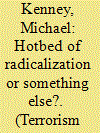| Srl | Item |
| 1 |
ID:
109784


|
|
|
|
|
| Publication |
2011.
|
| Summary/Abstract |
A series of police raids in Príncipe Alfonso, a Muslim neighborhood located in the Spanish enclave of Ceuta, "confirmed" law enforcement officers' worst fears: the barrio, long considered a hotbed of Islamist radicalization, had succumbed to the influence of extremists, making Spain more vulnerable to terrorist attacks. However, the meager results of the raids, as well as delays in the ensuing criminal investigation, raised troubling questions about the alleged terrorist plot and outsiders' perceptions of the Muslim community. Seeking answers to these questions, I conducted ethnographic field work in Príncipe shortly after the raids, interviewing residents, activists, and officials and observing the community at length. The community I experienced did not match the neighborhood I had read about. This article, the first ethnographic study of Ceuta to focus on radicalization, challenges conventional understandings of Príncipe Alfonso and highlights the value of ethnographic field work in terrorism studies.
|
|
|
|
|
|
|
|
|
|
|
|
|
|
|
|
| 2 |
ID:
192962


|
|
|
|
|
| Summary/Abstract |
Liberal democracies politicize racist incidents at the expense of institutionalizing antiracist ideologies through party politics. This article is concerned with how racial experience shapes how people come to ‘know the political’ in Ceuta, a Spanish city on the Spanish-Moroccan borderland. Knowing the political is an embodied form of subjectivity that makes meaningful sense out of governmental politics as an extension of social life. After examining racial experiences in the lives of Muslim politicians and their supporters, the article examines how the UDCE, a political party primarily composed of Muslims, practices and articulates political ideologies shaped by their experiences as Muslims in Ceuta. Popular and political reactions to the UDCE’s political interventions reveal social unease with racialized peoples conducting political affairs as racialized peoples. This unease, in turn, is rooted in broader sociocultural and historical processes that exclude racial experience from the core practices and ideologies of liberal democratic governance.
|
|
|
|
|
|
|
|
|
|
|
|
|
|
|
|